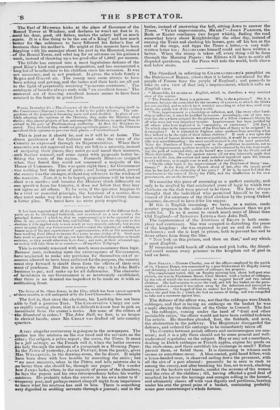The Standard, in referring to CHATEAUBRIAND'S pamphlet on the Dutchess
of BERRY, allows that it is better calculated for the people of France than the people Of England ; and proceeds to take its own view of that 'lady's imprisonment, which it calls an English view.
, Meanwhile, let us take an English, which is, therefore, a very suc'einet view of the matter.
" The Dutchess of Berry is a prisoner. Why is she a prisoner ? She is a prisoner, because she contended for the recovery of it crown, to which she thinks her son entitled, and to which be is entitled according to what was, until very lately, the public law of the civilized world. " Now, imprisonment is a hardship or infliction, and, like every other hard- ship or intlietion, it must be justified by reasons: accordingly, one of two rea- sons has always been assigned for the privations of a fellow creature's liberty by all who woe not very impudent tyrants. Imprisonment has been justified by all others who have imposed it as exemplary, or cautionary.' (3d Inst.) m which class is the itnprisonmeut (lithe Dutchess of Berry to be assigned ? Is it exemplary? Is it intended to frighten other mothers from asserting what - they believe to be the right of their infant children ? If such a war upon the most sacred of human instincts were ever justifiable, it would be a monstronsly silly war notwithstanding: the mint sacred instinct is also the most powerful.. Went the Dutchess of Berry consigned to the guillotine to-morrow, nut to speak of imprisonment, mothers would he as little deterred by her fate from tread- iog the path of maternal duty, as she herself was deterred by the bloody cud of - Marie Antoinette. The war against nature (if we may innocently apply that tel to (iod's law, the earliest awl most universal impressed upon tho. human. heart) will ever, as it ought ever to end, in defeat and disgrace. " On the other hand, is the imprisonment of the Dutehess of Berry g cau- tionary ?' Is the King of the French afraid of her, after the recent proof • that he has had of the imbecility of her party ? If he is, he must feel that the attachment to the entice of Henry the Fifth, and the disaffection to his own, government, are on the increase."
We consider this piece of reasoning as a perfect curiosity, and only to be rivalled by that celebrated piece of logic by which two chickens on the dish were proved to be three. We have always thought that the individual who permitted himself to be con-- vinccd of tl:c existence of the third chicken by the young Oxford: reasoner, deserved to have it for his supper. If this is English reasoning, we have, as a nation, made, greater progress in the noble art of bamboozlement than we get credit for. , To us it seems to smack much more of Douai than Old England—of IGNATIUS LOYOLA than John Bull. The imprisonment of the Dutchess of BERRY is both exem- plary and cautionary. She was occupied in disturbing the peace • of the kingdom : she was captured to put an end to such dis- turbances; and she is kept in prism, both to prevent her and to- deter others from doing the like. " Now look on this picture, and then on that," and say which: is most English. If reasthang could knock off chains and pick locks, the Stand- ard could reason every prisoner in the kingdom out of gaol in half an hour.






















 Previous page
Previous page